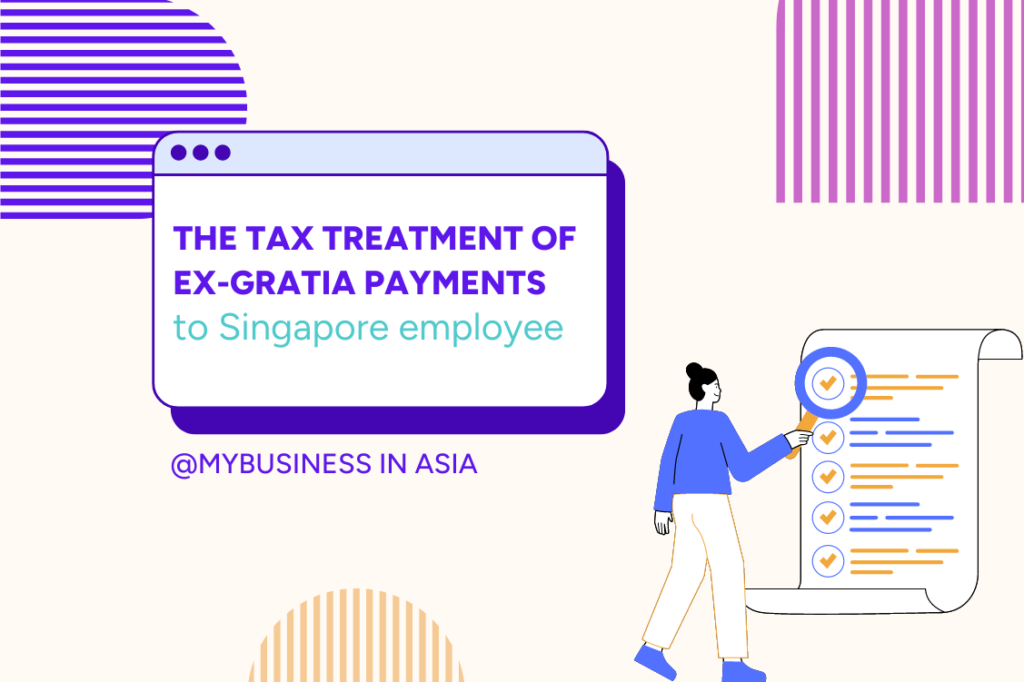
In this article, we will cover:
- The tax clearance obligation for employees
- What is an ex-gratia payment?
- The identification of an ex-gratia payment: Decision GCT v Comptroller for Income tax from The Income Tax Board of Review
The tax clearance obligation for employees
In the event of a termination of an employment contract with a non-Singapore citizen employee, the employer must proceed to a tax clearance by filing the Form IR21 one month before:
- The employee ceases to work for you in Singapore;
- The employee starts an overseas posting; or
- The employee leaves Singapore for any period exceeding three months.
In Form IR21, the employer has to indicate all incomes received upon termination, such as gross salary, bonus or director fees and other types of incomes, such as ex-gratia payment, allowances, compensation for loss of office, etc. The form has to be submitted to the Inland Revenue Authority of Singapore (‘IRAS”) which will then determine the amount of income tax that needs to be paid.
What is an ex-gratia payment?
The Section 10 (2) (a) of the Income Tax Act of Singapore (‘ITA’) provides a list of income’s categories that are considered as gains or profits from any employment and thus, subject to income tax.
Please note : Any wages, salary, leave pay, fee, commission, bonus, gratuity, perquisite, or allowance (other than a subsistence, travel, conveyance or entertainment allowance which is proved to the satisfaction of the Comptroller to have been expended for purposes other than those in respect of which no deduction is allowed under section 15) paid or granted in respect of the employment, whether in money or otherwise
However, it has been observed that it might be difficult to determine the taxability of certain incomes received by the employee, e.g., ex-gratia payments.
Indeed, as a consequence of the termination of a labor contract, it is common for an employer to grant his employee an ex-grata payment to reward him for his work done.
An ex-gratia payment is a payment made by an employer to an employee without any contractual obligation to do so. Indeed, the Latin translation of “ex-gratia” means by favor. Thus, it refers to a gesture of goodwill from the employer.
Frequently, when an employer pays a sum of money to an employee, it can be confusing to identify the nature of this sum of money. An ex-gratia payment can be identified as a severance payment that is different. Indeed, a severance payment constitutes compensation for loss of office and is not taxable because it is considered a capital receipt.
To compare severance payments to ex-gratia payments, an ex-gratia payment is made for past services done by the employee and not for loss of office. As ex-gratia payment is made for services rendered to the company, which is therefore identified as gain or profit from employment, it is thus, taxable.
The identification of an ex-gratia payment: Decision GCT v Comptroller for Income tax from The Income Tax Board of Review
As explained earlier, when an employee receives an ex-gratia payment, he has to pay tax on this income. However, it can be hard to determine the nature of a payment.
The Singapore Income Tax Board of Review (ITBR), with its decision GCT v. Comptroller for Income Tax (‘GCT v CIT’) dated on 21, 2020 has brought clarification to determine the taxability of an ex-gratia payment given to an employee upon termination of employment contract.
The decision GCT v CIT, points out the importance of strictly interpreting Section 10(2) (a) of the ITA in order to determine if a payment falls into one of the nine categories list out in this section.
This means that only income referring to one of these nine categories is taxable. The section does not mention compensation for loss of office or redundancy payments that are thus not taxable.
Moreover, GCT v CIT provides that an ex-gratia payment does not constitute a gain or profit from employment but constitutes a payment for loss of office if the payment is:
- Subordinates to the termination of the employment contract;
- Not related to any services rendered to the company by the employee; and
- Subordinates to the execution of a deed that appears to be a restrictive covenant for which payment is generally capital in nature.
In this case, the payment is made for loss of office and is not taxable.
GCT v CIT specifies also that an ex-gratia payment is made to compensate for past, present, or future services and is not supposed to be contractual.
To conclude, the taxability of an income should be based on its nature, and characteristics rather than its form. The employer should clarify what kind of payment he wants to grant his employee. The employer should be careful with the documents or information he gives to justify the taxability of an income.


